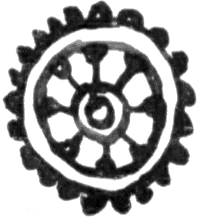- Understand the mechanics of both modifier compounds (tatpuruṣāḥ) and exocentric compounds (bahuvrīhayaḥ). Complete the exercises for forming these compounds below.
Modifier Compounds (tatpuruṣāḥ)
Adhyayanavidhiḥ: Endocentric compounds; Vibhaktitatpuruṣāḥ; Karmadhārayāḥ
Exocentric Compounds (bahuvrīhayaḥ)
I remind you that the standard school-text on compounds, Samāsacakram, is available with a translation, and you are strongly recommended to have a look through it, although (once again) there will be a lot here that we haven’t discussed yet.
Distinguishing bahuvrīhis from tatpuruṣas
As you heard in the lecture, there will be cases in which “the same word” can be read in two drastically different ways, depending on whether it is taken as a tatpuruṣa or a bahuvrīhi. We saw the following two examples:
-
indraśatrúḥ · vardhasva ·
“May you grow to be Indra’s killer!”
indraśatrúḥ means indrasya śatruḥ, “the killer of Indra” -
índraśatruḥ · vardhasva ·
“May you grow to be killed by Indra!”
índraśatruḥ means indraḥ śatruḥ yasya saḥ, “one of whom the killer is Indra”
-
lōkanāthaḥ
From this verse. As a tatpuruṣa, it means “the protector of the world” (lōkasya nāthaḥ). This is the usual reading. As a bahuvrīhi, it means “one for whom the entire world is just his king” (lōkaḥ nāthaḥ yasya saḥ).
This shows that it can sometimes be tricky to distinguish tatpuruṣa and bahuvrīhi compounds. Sometimes you can avail yourself of the following clues:
- if the final word appears in a gender other than the one which it usually has, it’s probably a bahuvrīhiḥ (e.g., bahujñānaḥ, one whose knowledge is great);
- if the final word has a -ka suffix, it’s probably a bahuvrīhiḥ (e.g., jitātmakaḥ, one by whom the self has been conquered);
- if the first word is a past (passive) participle, it’s probably a bahuvrīhiḥ (e.g., adhītaśāstraḥ, one by whom the śāstras have been studied);
- if all else fails, it’s probably a bahuvrīhiḥ.
This distinction is often of philosophical importance. The third sūtra of the Brahmasūtras of Bādarāyaṇa says that Brahma is śāstrayōniḥ. This is a compound word made up of śāstram “sacred texts” and yōniḥ “source.” What would this compound mean if it was taken as a tatpuruṣa compound? And what would it mean if it was taken as a bahuvrīhi?
1. Modifier compounds
For each of the following phrases, translate it into Sanskrit twice, first (a) using separate words (keeping the head word in the nominative case), and second (b) using a compound word. Finally (c) label the type of compound you’ve formed.
- happy face
- completed (lit. “done”) task
- excessive toil
- abundant flowers
- long sword
- insignificant knowledge
- the place of battle
- the statements of the people
- exertion in the śāstras
- the noose of Yama (yamaḥ, masc.)
- the beauty of Sītā (sītā, fem.)
- the armies of the Rākṣasas (rākṣasaḥ, masc.) and the monkeys (vānaraḥ, masc.)
- killed by Rāma (rāmaḥ, masc.)
- killed by Rāma’s arrow
- composed by the students
- a poem composed by the students
- a sound heard by everyone
- not a Rākṣasa
- Note: for these you will form negative compounds, which involve compound a word with the negative particle. This particle takes the form a- before consonants and an- before vowels.
- not defeated
- an undefeated army
2. Exocentric compounds
For the following, you will form an exocentric (bahuvrīhiḥ) compound based on the given phrase; the external head is given in parenthesis, and you should make the compound agree with each head in gender and number. Note that you can always use the suffix -ka to make a stem that is easier to inflect (masculine -kaḥ, neuter -kam, feminine -kā).
- happy-faced (man, woman)
- one (a man, woman) by whom his/her task has been completed (lit. “done”)
- one (a man, woman) by whom exertion has been made
- one (a man, woman) whose knowledge is insignificant
- one (a man, woman) whose beauty is great (adhika-)
- (a man, woman) whose feet have been touched
- (a man, woman) by whom the feet of the king have been touched
- (a man, woman) to whom abundant jewels have been given
- (a place) where flowers are plentiful
- (Yama) in whose hand there is a noose
- (Rāma) by whom Rāvaṇa has been killed
- (a man, woman) by whom a poem has been composed
- (a man, woman) from whom desire has gone away
- (an army) of which the soldiers are few
- (a battle) in which many soldiers have been killed
- (a place) where there are no trees
- Note: These, too, are negative compounds, formed by prefixing the negative particle a- (before consonants) and an- (before vowels) to the final member of the compound.
- (a family) in which there are no women
- (a man, woman) by whom exertion has not been made
- (a thing, word) of which there is no meaning
- (a man, woman) who has no manuscripts
Try your hand at the following verses. Some of them you may have seen before, but this time around, pay attention to the compounds, and try to understand what types of compounds they are:
- Mahāsubhāṣitasaṅgraha 1613
- Mahāsubhāṣitasaṅgraha 1680
- Caurapañcāśikā 2 (this is hard, and there are forms you won’t recognize, but look at the compounds and try to see how they are composed);
- Caurapañcāśikā 1 (ditto)


